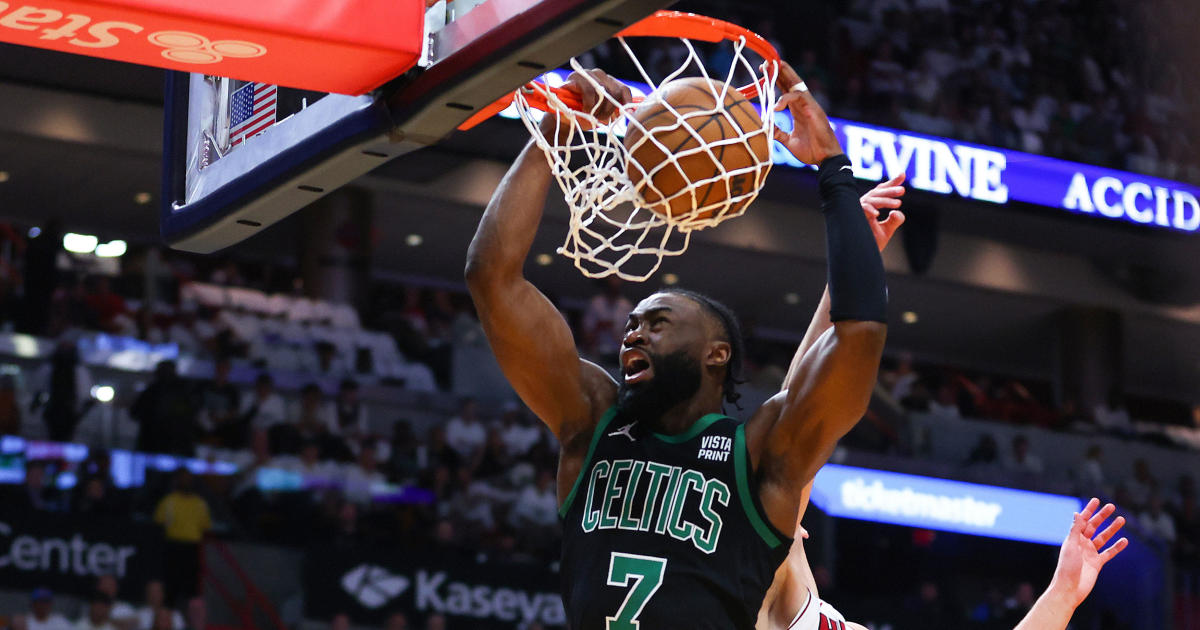NFL Plans On Making 17-Game Season, Changing Playoff Format ... For No Real Reason
By Michael Hurley, CBS Boston
BOSTON (CBS) -- We live in a society where being great is never good enough. No matter what, there just always has to be growth. There has to be more.
Perhaps that's an offshoot of capitalism (not trying to get political here, folks!), or perhaps it is an element of human nature to just want more, more, MORE. But in the case of the National Football League, it's become quite clear that being arguably the richest and most powerful sports league is not enough. Profits must grow. The billions must increase. We. Need. More.
As such, the league is apparently opting to change its 16-game schedule (which is close to perfect) and radically reform its playoff format (which is undeniably perfect as it is). Adam Schefter broke the news on Wednesday evening -- news which seems not so great to the average player or football team but seems great for owners who are now in position to make a whole lot more money.
Though the new collective bargaining agreement has not yet been finalized, Schefter reported that it could get done this week. And it'll likely include the following changes:
--Instead of 12 playoff teams (six per conference) with four first-round byes (two per conference), the playoff field will expand to 14 teams (seven per conference) with just two first-round byes (one per conference).
--The regular season will be increased from 16 games to 17 games. The preseason will be reduced from four games to three games.
According to a source that talked to Schefter, the playoff changes have "been agreed to for a long time" and "there wasn't a lot of disagreement to that issue."
There should have been.
On the expansion of the field from 12 teams to 14 teams, that part doesn't matter a whole lot, really. It makes sense, too, because adding a playoff spot can keep anywhere from two to four teams "in the mix" for a postseason spot through the final week of the season. Keeping hope alive in three-to-six extra NFL cities will lead to increased ratings and interest late in the season, which is fun for both viewers and the teams involved.
Plus, it's largely an irrelevant change in that regard, because the team sneaking into the playoffs as a seventh seed will ... most assuredly stink.
Considering it's been extraordinarily difficult for a sixth seed to win a Super Bowl (only two sixth seeds have won the Super Bowl since the 12-team format was introduced in 1990), these additions likely won't change history on their own.
Last year, it would've been the 8-8 Steelers (stink) and 9-7 Rams (stink) creeping into the playoff field. A year prior, it would have been the 9-6-1 Steelers (stink) and the 8-7-1 Vikings (stink) getting in. In 2017, it would've been the 9-7 Ravens and 9-7 Lions. In 2016, the 9-7 Titans and 9-7 Buccaneers; 2015, a 10-6 Jets team and an 8-8 Falcons team. Stink, stink, stink, stink, stink.

So some bad teams will get into the playoffs and not win the Super Bowl. Big deal.
The real issue at hand is the elimination of the second first-round bye in each conference. That's a change that can monumentally change football history, and likely in an unfair way.
The problem, you see, is that teams do not play the same schedules. As such, the degree of difficulty in going, say, 13-3, is not the same for Team A and Team B. In one season, Team A might face teams with a collective winning percentage of .450, while Team B might face teams with a collective winning percentage of .530. Team A might stack up 13 wins against that weak schedule, while Team B might finish the year with "just" 12 wins.
Under the system that's worked well for 30 years, the presence of two first-round byes has largely alleviated any such issues. While there's been the possibility of a Team C suffering from a slightly unfair fate, the potential damage has at least been mitigated significantly by the two-bye system.
Under the new system, no such luck.
We need not utilize an imaginary scenario to show the faults.
Consider 2017. The Vikings and Eagles both went 13-3. The Eagles got the No. 1 seed on account of having a better record in common games. The Vikings played a more difficult schedule (.492 strength of schedule, compared to Philly's .461) and had more impressive wins (.447 strength of victory compared to Philly's .433), but the tiebreaker rules gave the No. 1 seed to Philly.
That mattered in terms of home-field advantage for the NFC title game, sure, but it didn't matter in terms of costing Minnesota a first-round bye, which is a much more significant matter.
Or back a year to 2016. The Patriots went 14-2, which is very good! But they also have a .439 strength of schedule, which is not good! The Chiefs went 12-4 that year while having a .508 strength of schedule. They got a bye; under the new system, they'll be playing on wild-card weekend.
Or look at the NFC in 2013. The Falcons earned the top seed with 13 wins, though they had a .422 strength of schedule. The Niners won 11 games despite a much tougher (.504) schedule.
You could try to argue that the 2017 Eagles deserved a bye and the 2017 Vikings did not, or that the 2016 Patriots deserved a bye but the Chiefs did not, or that the 2013 Falcons deserved a bye but the 49ers did not. But you'd fail. The work of both teams over the course of 16 games determined both worthy of resting and healing injuries on wild-card weekend.
That's proven to be a significant advantage, obviously. The Super Bowl has featured only teams that enjoyed first-round byes for six years running. And thankfully, USA Today did the math last month.
Since 1990, 12 teams without a first-round bye have made the Super Bowl.
Since 1990, 48 teams with a first-round bye have made the Super Bowl.
Further:
Since the league instituted a seeding system in 1975, the No. 1 or No. 2 seeds have reached the Super Bowl 73* times while all other seeds got there 17 times. Only 10 of the 44 champions in that span were seeded Nos. 3-6. (*Updated to reflect 2019 Super Bowl participants.)
CBS Sports put together a nice little package, too, prior to the start of this year's postseason.
Seeds to make the Super Bowl since 1990
No. 1: 51.7%
No. 2: 27.6%
No. 3: 3.4%
No. 4: 12.1%
No. 5: 1.7%
No. 6: 3.4%
The advantage only went up after the Chiefs (No. 2 seed, bye) and 49ers (No. 1 seed, bye) made the Super Bowl.
Part of that advantage obviously has to do with the better teams earning those byes. But the difference in greatness between the top two teams in a conference and the third-best team in the conference is not actually represented by the 76 percent gap in frequency of reaching the Super Bowl. The significance of getting a week off after a long and grueling season is massive. And now that advantage is being taken away, all in the name of adding two games to wild-card weekend -- games featuring teams that realistically have no shot of winning the Super Bowl.
Would the second-seeded Chiefs be world champs right now if they had to play on wild-card weekend? What about the 2018 or 2004 Patriots, or the 2008 Steelers, who were No. 2 seeds before winning the Super Bowl? The answer changes NFL history.
It's all, naturally, about money. Dollars. The addition of a regular-season game is, of course, entirely about generating more revenue, because $16 billion is simply not enough revenue -- not when there's $4 billion more in revenue to be had out there. And once that extra $4 billion is attained, it will be time for $4 billion more to be made.
That is the system, and in this instance, it's hurting the competitive balance of the league. It's clear which one matters more to owners.
Alas, NFL owners do not want to let players rest. They want to get more out of their players, who are currently only giving them 16 games, at least one of which falls on a Thursday (just four days after their previous game). Plus they have that pesky bye week during the season. And then some teams get another bye week to start the playoffs. How much time off do they need? Don't these guys ever work?
That's obviously facetious, and the players will obviously be the ones signing up for this increased workload, which will pay each of them roughly 6 percent more per person. Rough math shows that to be about $60,000 for every $1 million earned. For a player on a league-minimum contract, it comes out to about $3,300 in extra cash. If that player's lucky enough to now be the third wild-card team, it's about an extra $28,000.
It's certainly possible (if not expected) that those numbers grow a bit, based on the increased revenue expected with the additional games. But still, that's hardly life-changing money, whereas an injury suffered due to the fatigue of a 17-game season plus a four-game postseason run could be a career catastrophe.
Oh, and don't ignore the international factor, as the NFL will be able to use that extra game on everyone's schedule to ship them to London, or Mexico, or China/Australia/Japan/Brazil/South Africa/Timbuktu or wherever the NFL identifies a market that presents a new stream of revenue. The players won't mind traveling around the globe -- what are we paying 'em for anyway?!
(Among the many issues with a 17-game season, too, is that it's unclear how exactly that extra opponent will be determined. The current system has every team playing six games within their own division, plus four games against another division within the conference, plus four games against a division in the other conference, plus two games against the teams within the conference that finished in the same place in their respective divisions the year prior. Based on the desires of the owners, the extra game would probably just be a decision based on whatever makes for the best TV ratings ... which may not align with the league's purported desire for parity and fairness and what have you.)
Clearly, if the new proposal takes root, the league will get more Super Bowl winners from teams without a bye. But the new system will still unnecessarily punish many great teams who will now fall short of winning a championship through little fault of their own. The hard work they put in over 16 games -- err, 17 games -- will be rendered meaningless, all in the name of the almighty dollar.
The owners appear to be letting dollar signs and easy playoff money distract from the fact that they may end up making it much harder on themselves to win Super Bowls. As usual, that appears to not be their primary concern.
You can email Michael Hurley or find him on Twitter @michaelFhurley.



